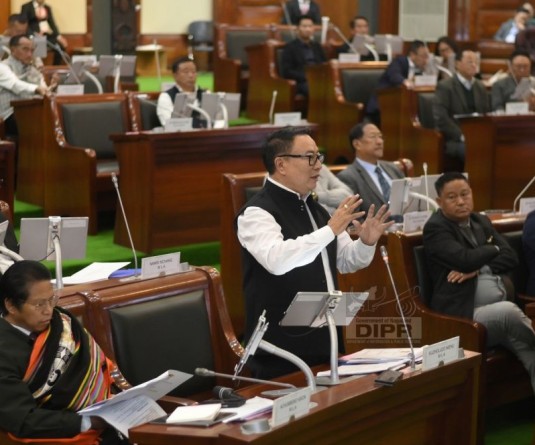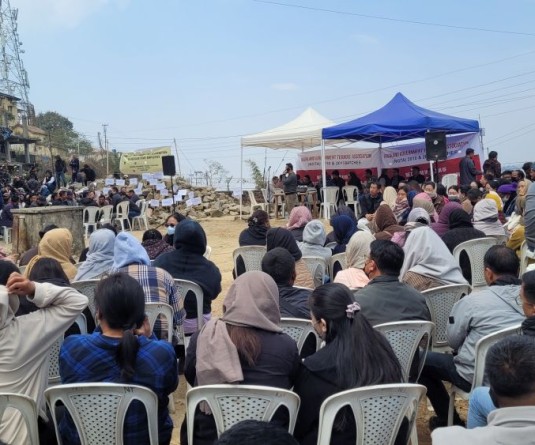
National seminar dwells on need to reclaim dignity of one’s cultural identity
Dimapur, October 17 (MExN): A two day national seminar on ‘Discoursing the shifts of the Naga society in North-East India’ was organized by the Naga Research Scholars Forum, University of Hyderabad in collaboration with the Centre for Study of Social Exclusion and Inclusive Policy on October 14 and 15. It was partially funded by the UPE II of the university.
The inaugural function was graced by Prof Sanjay, Pro Vice Chancellor, University of Hyderabad as the chief guest. In his speech, he felicitated the Naga Research Scholars’ Forum for their initiative in bringing about a platform for the young scholars to engage and disseminate ideas. He called the initiative ‘timely’.
Dean of School of Social Sciences, Prof K. K Misra, who chaired the session, stated that the seminar is very appropriate as it covered wide relevant themes. The keynote address was delivered by Dr Veio Pou, author of ‘Literary Cultures of India’s North East: Naga Writings in English’ on ‘engaging the dominant narratives in the Naga Society’.
Dr Pou observed that unprecedented changes had come about in the last six-seven decades in the Naga society. He deeply lamented that “we have failed to garner a cognitive mind to the impact of such changes and understand its agents.” Besides the various damages, according to him had been chiefly the damage on the understanding of one’s own traditional and cultural institutions. Therefore, he strongly stressed on the need to demystify some of the dominant narratives as a way to reclaim the dignity of one’s cultural identity. He pointed out the need to know the inherent ideological strains operational in the society and accordingly corrective measures must be taken up to counter such narratives.
The Naga Research Scholars Forum in a press release stated that considering the context of the multiple shifts that had taken place in the society, one is intrigued by the need to thrust for a comprehensive and critical understanding of the Naga society in the contemporary times. To do that, one of the main objectives of the seminar had been to engage academic endeavors from different disciplines which concerns past, present and future of the Nagas.
‘Discoursing the shifts’ was taken to employ new perspectives to understand the dynamics and the nature that has driven these shifts, and also locate the current debates around these divergences and convergences in the Naga society.
While Dr Ajailiu Niumai, Coordinator of the Seminar, emphasized on the purpose of the seminar which was to engage the young scholars and share ideas and current research works. She also pointed out the need to look at the society critically. Riku Khutso, PhD Candidate, Department of History, spoke on the concept and the scope of the seminar by underlying the need to identify new methodological frameworks and perspectives to understand shifts in the Naga society of North East India.
The seminar dwelt on different critical sub-themes starting with traditional knowledge systems and shifts which was chaired by Dr Ajailiu Niumai, Associate Professor CSSEIP; Christianity Education and Culture, chaired by Dr Venusa Tinyi, Assistant Professor, Department of Philosophy; Shifts in the Economic Domain, chaired by Dr Rani, Assistant Professor CSSEIP; Colonial Occupations and Shifts, chaired by Limakumba Walling, Assistant Professor, School of Economics; Literature, Identity and Shifts, Chaired by Dr Graious Temsen, Associate Professor, Centre for Applied Linguistics; and Contemporary Discourses chaired by Dr Kham Khan Suan Hausing, Associate Professor, Department of Political Science.
Altogether 18 delegates and three in absentia papers. The delegates have come from Jawaharlal Nehru University, New Delhi, Jamia Milia Islamia University, New Delhi, Christ University, Bangalore, Delhi School of Economics, Delhi and University of Hyderabad.
The valedictory session was graced by Prof Sudhir Jacob, Retd Professor of Department of Political Science. He cherished his long association with the North-East region, and in particular the Nagas. He pointed out that the Nagas need to deconstruct the baggage of colonization and westernization and reconstruct the society based on their rich indigenous culture and traditions. While challenging the young people to remember their roots and stressed the need to visit villages and document the oral resources before it vanishes. The vote of thanks was proposed by Amihe Swu, PhD candidate, Department of English, after which the seminar was formally closed.






